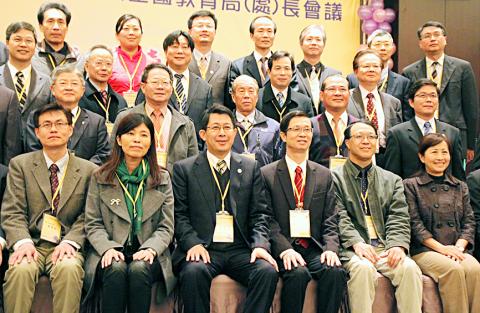Democratic Progressive Party (DPP) Legislator Chen Ting-fei (陳亭妃) yesterday urged Minister of Education Chiang Wei-ling (蔣偉寧) to fulfill his promise to make native languages a mandatory course at junior-high schools or step down if he fails to do so.
“Chiang made the promise several times at legislative meetings in October last year, and was even berated by several members of the national curriculum outlines adjustment committee at a meeting on Nov. 11 for making a hasty decision before the conclusion of public deliberations on the new curriculum, as required by law,” Chen said.
Chen added that Chiang should resign if he broke his vow to make native-language courses — which are currently optional — mandatory, with classes being held at least once a week.

Photo: CNA
According to the ministry’s timeline, nine public hearings on the draft curriculum are to be held later this month. A final version is due to be published in July, one month before the 12-year national education program takes effect in August. It will officially implemented in 2018.
The 12-year program will make three years of senior-high school part of the compulsory system of education.
A member of the committee who requested anonymity said that the committee’s main task was to decide the number of class hours allocated to each course.
“There is really no way we can squeeze in an extra hour for native-language courses if we are to follow the rule of not increasing the total number of class hours,” the member said.
“The aim of the 12-year program is to put more emphasis on personalized learning, which is why we have refrained from increasing class hours for mandatory courses. Students can then have more time to choose subjects that interest them,” the member said.
Although the draft curriculum still marks native languages as an elective, it lists the mother tongues of “new immigrants” as the nation’s fourth native language other than Taiwanese (also known as Hoklo), Hakka and Aboriginal languages, the member said.
This means that children of “new immigrants” — mainly foreign spouses from China, Vietnam, Indonesia, Thailand and the Philippines — are now given the choice of learning their parents’ native language.
Taiwanese Mother Language League director-general Chou Ching-yu (周清玉) said she believed Chiang would honor his promise, as he risks offending many language teachers and pro-localization groups who have been closely following the issue if he does not.
When asked for comment yesterday, Chiang said he would make every effort to deliver on his pledge.

SECURITY: As China is ‘reshaping’ Hong Kong’s population, Taiwan must raise the eligibility threshold for applications from Hong Kongers, Chiu Chui-cheng said When Hong Kong and Macau citizens apply for residency in Taiwan, it would be under a new category that includes a “national security observation period,” Mainland Affairs Council (MAC) Minister Chiu Chui-cheng (邱垂正) said yesterday. President William Lai (賴清德) on March 13 announced 17 strategies to counter China’s aggression toward Taiwan, including incorporating national security considerations into the review process for residency applications from Hong Kong and Macau citizens. The situation in Hong Kong is constantly changing, Chiu said to media yesterday on the sidelines of the Taipei Technology Run hosted by the Taipei Neihu Technology Park Development Association. With

CARROT AND STICK: While unrelenting in its military threats, China attracted nearly 40,000 Taiwanese to over 400 business events last year Nearly 40,000 Taiwanese last year joined industry events in China, such as conferences and trade fairs, supported by the Chinese government, a study showed yesterday, as Beijing ramps up a charm offensive toward Taipei alongside military pressure. China has long taken a carrot-and-stick approach to Taiwan, threatening it with the prospect of military action while reaching out to those it believes are amenable to Beijing’s point of view. Taiwanese security officials are wary of what they see as Beijing’s influence campaigns to sway public opinion after Taipei and Beijing gradually resumed travel links halted by the COVID-19 pandemic, but the scale of

A US Marine Corps regiment equipped with Naval Strike Missiles (NSM) is set to participate in the upcoming Balikatan 25 exercise in the Luzon Strait, marking the system’s first-ever deployment in the Philippines. US and Philippine officials have separately confirmed that the Navy Marine Expeditionary Ship Interdiction System (NMESIS) — the mobile launch platform for the Naval Strike Missile — would take part in the joint exercise. The missiles are being deployed to “a strategic first island chain chokepoint” in the waters between Taiwan proper and the Philippines, US-based Naval News reported. “The Luzon Strait and Bashi Channel represent a critical access

Pope Francis is be laid to rest on Saturday after lying in state for three days in St Peter’s Basilica, where the faithful are expected to flock to pay their respects to history’s first Latin American pontiff. The cardinals met yesterday in the Vatican’s synod hall to chart the next steps before a conclave begins to choose Francis’ successor, as condolences poured in from around the world. According to current norms, the conclave must begin between May 5 and 10. The cardinals set the funeral for Saturday at 10am in St Peter’s Square, to be celebrated by the dean of the College